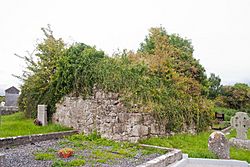Gallen Abbey facts for kids
| Mainistir Ghailinne | |
 |
|
| Monastery information | |
|---|---|
| Order | Celtic Christianity |
| Established | 492 |
| Disestablished | 1571 |
| Diocese | Ardagh |
| People | |
| Founder(s) | Saint Canoc |
| Architecture | |
| Status | Inactive |
| Heritage designation | National Monument |
| Style | Irish monastic |
| Site | |
| Location | Gallen, County Offaly |
| Coordinates | 52°51′29″N 6°56′30″W / 52.858035°N 6.941791°W |
| Public access | Yes |
Gallen Abbey or Gallen Priory is an old monastery and a special National Monument in County Offaly, Ireland. It has a long and interesting history, going back over 1500 years.
Contents
Where is Gallen Abbey?
Gallen Abbey is found in County Offaly, Ireland. It sits on the south side of the Brosna River. It's about 1 kilometer (a little over half a mile) south of a town called Ferbane.
A Look at Gallen Abbey's History
The Abbey's Beginning and Early Troubles
Gallen Abbey was started way back in 492 AD. It was founded by a person named Saint Canoc, who was the son of Saint Brecan. Saint Canoc decided to settle near what is now Ferbane. At that time, this area was known as Delbhna Eathra.
The abbey faced some tough times early on. In the 820s, the king of Munster, Tnúthgal mac Donngaile, attacked the area. This caused damage to the abbey. Later, monks from Wales helped to rebuild it. They even turned the monastery into a school.
More trouble came in 949. Cellachán Caisil, another king from Munster, invaded the area again. He almost completely destroyed the abbey. A stone church that was part of the abbey was ruined in this attack. Today, the oldest building you can see at the site is from the 11th century.
Changes in the Irish Church
For a long time, the Irish Church had its own unique traditions, often called Celtic traditions. But in the 12th century, big changes began. The main Catholic Church in Rome wanted more control. This meant that the Pope's authority would be stronger in Ireland.
Religious groups, like the monks at Gallen Abbey, were especially affected. A big meeting called the Lateran Council in 1159 encouraged churches to follow a more organized way of life. They suggested following the Rule of St. Augustine, which was a set of rules for monks.
The Irish monks, including those at Gallen Abbey, slowly started to follow these new rules. They gradually gave up their old Celtic ways. Around this time, a powerful local family called the Mac Coughlans became very important in the area. The leaders of this family often held two important jobs: they were both the head of their clan and the leader (Prior) of the monastery. The Mac Coughlan family stayed powerful in local politics until the 1700s.
The Abbey's Lands and New Owners
In 1556, a plan was announced to bring English settlers to parts of Ireland, including the areas of Laois and Offaly. This was called the Plantations of Laois and Offaly. However, local people fought back fiercely against the British soldiers. This slowed down English settlement for about 50 years.
In 1571, a man named George Bouchyer was supposed to get control of the lands around the abbey. After some arguments about who owned the land, Sir Gerard Moore was finally given the land in 1612. He had to pay a yearly rent of £3-12-2. This land included the church, a cemetery, five small houses, and two gardens in the town of Gallen. It also had 40 acres of farmland and 30 acres of pastures and forests.
The last family to own the abbey lands was the Armstrongs. They were a Scottish family who came to the area before 1745. In 1841, Andrew Armstrong was given a special title called a baronet. His grandson, Sir Andrew Harvey Armstrong, sold the property in 1923. It was bought by the Sisters of Saint Joseph of Cluny, a group of nuns.
 | Emma Amos |
 | Edward Mitchell Bannister |
 | Larry D. Alexander |
 | Ernie Barnes |


